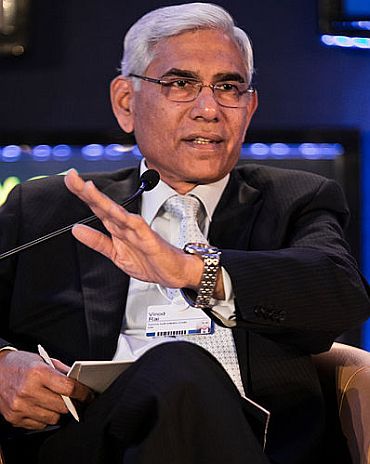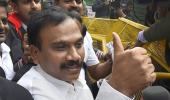'As someone who had the opportunity of cross examining Vinod Rai, extensively over three days as part of the Joint Parliamentary Committee, many of us included I had concluded at that point of time that this report rests on the foundation of sand.'

IMAGE: Then comptroller and auditor general Vinod Rai whose claim that a loss of Rs 1.76 lakh crore was incurred in issuing 2g licenses, 'started the whole 2G circus rolling,' says Manish Tewari, a member of the then Joint Parliamentary Committee that examined matters relating to allocation and pricing of telecom licences and spectrum.
Manish Tewari, information and broadcasting minister in the United Progressive Alliance government and a member of the Joint Parliamentary Committee that examined matters relating to allocation and pricing of telecom licences and spectrum, tells Aditi Phadnis that the implications of the 2G spectrum judgment are huge.
How should we see the 2G spectrum judgment?
The clear conclusion of the trial court is that the decision-making process wasn't actuated by any kind of mala fides or any kind of pecuniary benefit to any of the accused.
But the Supreme Court has already thrown out the allocation of licences in an earlier order based on procedural infirmities...
The Supreme Court, in its judgment in 2012, came to a conclusion based upon the principle that auction is the best way to allocate natural resources.
With great respect to the Supreme Court, that may not be the correct position. And, in the light of the trial court judgment, maybe some of the Supreme Court's orders may require a revisit.
So, you are saying that evidence assessed by the trial court is more valid and compelling than what the Supreme Court used to reach its decision?
These are two different aspects.
The policy of giving spectrum at administered prices to private players was put in place in 1994, in pursuance of the telecom policy which was articulated at the time.
This policy of giving spectrum at administered prices was implemented by P V Narasimha Rao's government, then by H D Deve Gowda's government, then by Inder Kumar Gujral's government, then by Atal Bihari Vajpayee's government for six years, and subsequently by Dr Manmohan Singh's government for eight long years.
It was a consequence of giving spectrum at administered prices that saw the kind of exponential increase in teledensity that India has today -- along with the lowest tariff in the world, which makes telephony and especially mobile telephony affordable to a common person.
In 2013, the Supreme Court in its wisdom decided to rest the entire allocation of natural resources on the principal that auction would possibly be the best way of alienating the state largesse.
Subsequently the auctions took place, both under the UPA and the NDA (National Democratic Alliance) governments, and today you have a situation where the telecom sector is stressed, telecom operators are going to the government cap in hand asking for a bailout and the estimation of the bailout amounts to an estimated Rs 4 lakh to Rs 5 lakh crore.
And the rationale being given is that if the telecom sector is not bailed out, the banks would be stressed and all those loans that were given out to bid for spectrum auction would turn into non-performing assets.
This, then, raises the fundamental question that is it the job of the State only to maximise its own revenue? Or look to the larger question of public welfare?
And since the trial court has found there is no criminality involved in the allocation of spectrum at administered prices, possibly this judgment of the Supreme Court may require a revisit -- and it has happened in the past when the Supreme Court has revisited its own judgments.
A lot of people did very well by the whole so-called telecom scam. Many of them got jobs, some got awards... How should we see this?
Well, first and foremost, the then comptroller and auditor general Vinod Rai needs to offer an unequivocal apology to the country for that 'Manohar Kahani' which unfortunately goes by the term that carries a lot a gravitas -- the CAG report -- where he alleged a loss of Rs 1.76 lakh crore.
That is what started the whole 2G circus rolling.
Over the past seven years, people's lives have been ruined, reputations have been destroyed, India's image has been besmirched, the economy which survived the great economic meltdown was derailed -- all, as a consequence of this completely ill-conceived report.
As someone who has had the opportunity of cross examining Vinod Rai, extensively over three days as part of the Joint Parliamentary Committee, many of us included I had concluded at that point of time that this report rests on the foundation of sand.
Ultimately, the JPC report tabled in January 2014, actually testified to that reality.
Now you have a criminal court which has also held that there was no criminality in either the grant of licences or allocation of spectrum.
So, under those circumstances, it is imperative that all the reports which were given by Vinod Rai during his tenure as CAG be revisited and everything be re-audited -- because it is very clear that they were actuated by mala fide.
And the irony is that the CAG report which actually set off this entire chain of events was not even a relied-on document by the prosecution during the seven-year 2G trial.
There are a number of companies that are saying that they were treated badly, treated unjustly by India and might take the government to court, possibly arbitration.
First and foremost is the question of appeal. Even before the ink had dried on the order, the Central Bureau of Investigation and the Enforcement Directorate announced that they would be filing an appeal in the high court.
This begs the fundamental questions that the CBI and ED are not private lawyers. They cannot take arbitrary decisions. They perform sovereign functions.
After the judgment of the Jain hawala diaries case, there is an independent Directorate of Prosecutions, which was established for both these agencies.
Who, in these agencies, actually read through these three judgments -- each one of them more than 1,500 pages long -- and came to the conclusion that the judgment was arbitrary and needed to be appealed against?
And what kind of process has been followed before the summary announcement by the CBI and the ED that they would be appealing these judgments?
Are these appeals only for the sake of appeals?
So that's the first fundamental question which the people who were accused are going to ask.
The second hurdle is going to be that this is going to be an appeal against acquittal where there is a higher standard of proof, a higher burden of responsibility to be discharged.
When you are appealing against acquittal you have to take leave of the high court even for admission of an appeal against acquittal.
And third is going to be the question of damages, malicious prosecution, and of course, the companies would be fairly entitled to ask both the governments and maybe appeal even against the Supreme Court that their licenses should be restored.
So all the efforts that went into 'fixing' decisions in favour of one corporate entity -- the taped evidence of fixing... what should we make of all that?
It was very simple. It was a corporate war. Those who got licenses for a pittance in 1994-1995 and for Rs 1,651 crore in 2001 -- they knew that when their licenses come up for renewal in 2015-2016 or a little later, they would not get it at the 2001 prices.
And, when new operators got licenses at 2001 prices, they (rival companies) moved heaven and earth to get them out.
And that's why the judge possibly came to the conclusion that a set of facts was artfully arranged to give the appearance of a scam when there was none in the first place.
And the CAG became a witting or unwitting actor in a corporate war.
Going forward, do you see the DMK (Dravida Munnetra Kazhagam) changing course?
The DMK has gone through a lot of vicissitude in its history.
I don't think people make political decisions based on judicial outcomes. This conspiracy theory that the government had a role in bailing out the DMK has no credence at all.
The difficulty is there was no case in the first place.
What do you think will happen now?
The government will try to file an appeal in double quick time in order to save face because the BJP (Bharatiya Janata Party) had built its entire 2014 campaign around 2G and other alleged indiscretions of the UPA government.
But I think there will be a very strong pushback from all those who have been acquitted.
So you will see a battle royale playing out.











 © 2025
© 2025